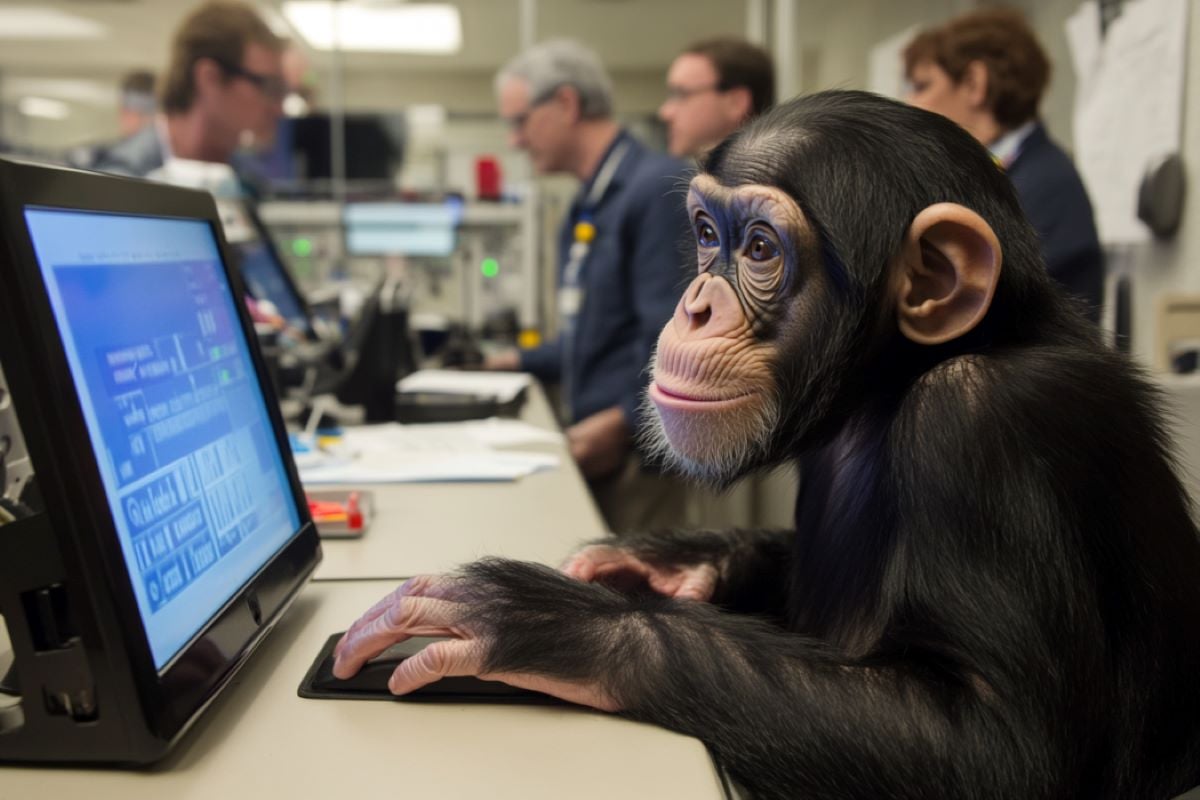Summary: A new study finds that chimpanzees, like humans, are affected by being watched: their performance on computer tasks improved on difficult tasks with larger human audiences but declined on simpler ones. This phenomenon, known as the “audience effect,” was previously thought to be unique to humans and linked to reputation management.
The results suggest that sensitivity to being observed may have evolved before human society developed its complex reputation-based social structures.
Key Facts:
- Chimpanzees’ performance improves on difficult tasks but declines on easy tasks with an audience.
- Six-year study observed thousands of trials where chimps completed tasks with human viewers.
- Audience effect may have evolved before human reputation-based societies developed.
Source: Cell Press
When people have an audience watching them, it can change their performance for better or worse.
Now, researchers reporting in the Cell Press journal iScience on November 8 have found that chimpanzees’ performance on computer tasks is influenced by the number of people watching them.
The findings suggest that this “audience effect” predates the development of reputation-based human societies, the researchers say.

“It was very surprising to find that chimpanzees are affected in their task performance by audience members, and by human audience members nonetheless!” says Christen Lin of Kyoto University in Japan.
“One might not expect a chimp to particularly care if another species is watching them perform a task, but the fact that they seem to be affected by human audiences even depending on the difficulty of the task suggests that this relationship is more complex than we would have initially expected.”
The researchers, including Shinya Yamamoto and Akiho Muramatsu, wanted to find out if the audience effect, often attributed in humans to reputation management, might also exist in a non-human primate.
People, they knew, pay attention to who is watching them, sometimes even subconsciously, in ways that affect their performance. While chimps live in hierarchical societies, it wasn’t clear to what extent they, too, might be influenced by those watching them.
“Our study site is special in that chimpanzees frequently interact with and even enjoy the company of humans here, participating almost daily in various touch screen experiments for food rewards,” Muramatsu says.
“As such, we saw the opportunity to not only explore potential similarities in audience-related effects but also to do so in the context of chimps that share unique bonds with humans.”
The researchers made the discovery after analyzing thousands of sessions in which chimpanzees completed a touch screen task over six years.
They found in three different number-based tasks that chimpanzees performed better on the most difficult task as the number of experimenters watching them increased.
In contrast, they also found that, for the easiest task, chimpanzees performed worse when being watched by more experimenters or other familiar people.
The researchers note that it remains unclear what specific mechanisms underlie these audience-related effects, even for humans. They suggest that further study in non-human apes may offer more insight into how this trait evolved and why it developed.
“Our findings suggest that how much humans care about witnesses and audience members may not be quite so specific to our species,” Yamamoto says.
“These characteristics are a core part of how our societies are largely based on reputation, and if chimpanzees also pay special attention towards audience members while they perform their tasks, it stands to reason that these audience-based characteristics could have evolved before reputation-based societies emerged in our great ape lineage.”
About this neuroscience research news
Author: Kristopher Benke
Source: Cell Press
Contact: Kristopher Benke – Cell Press
Image: The image is credited to Neuroscience News
Original Research: Open access.
“Audience Presence Influences Cognitive Task Performance in Chimpanzees” by Christen Lin et al. iScience
Abstract
Audience Presence Influences Cognitive Task Performance in Chimpanzees
Human cognitive performance can be significantly influenced by the presence of audience members. While often associated with reputation management, which is considered uniquely human, it is unclear to what degree this phenomenon is shared with non-human animals.
To investigate such audience effects in chimpanzees, we recorded the performance of six chimpanzees on three different numerical touch screen tasks varying in difficulty and cognitive demand, in the presence of variable audience member compositions over six years.
Our results indicated that chimpanzee performance was influenced by the number and types of audience present.
Performance increased for the most difficult task as the experimenter count increased, while for the easiest task, performance decreased as familiar audience and experimenter count increased.
This suggests that audience effects on cognitive processing can be found in chimpanzees and that the evolutionary roots of this trait may date back to before the development of reputation-based normative societies in humans.






